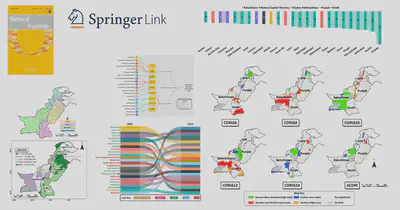Has Pakistan learned from disasters over the decades? Dynamic resilience insights based on catastrophe progression and geo-information models
Abstract
Since the last two decades, Pakistan has been often cited among the top ten countries most vulnerable to climate change and disasters, such as intense flooding, extreme heat, and droughts, among others. However, the unavailability of nationwide administrative-scale assessments from a space–time perspective hinders disaster resilience building in Pakistan. In this context, the key purpose of this study is to evaluate the spatial and temporal disparities in community disaster resilience (CDR) in Pakistan during 2004–2014—the period covering two of the most devastating disasters in Pakistan in recent history. Eventually, the dynamic nature of resilience is empirically demonstrated through the catastrophe progression method, and regions, where resilience increased/decreased, are identified using geo-information models, such as the Moran’s Index and the local indicators of Spatial Association (LISA). It is evident that CDR in the earlier, middle and final periods during 2004–2014 vary significantly (95% confidence). With inconsistent resilience distribution across Pakistan during 2004–2014, some noteworthy regional disparities are also found. For instance, while the overall lowest resilience is found for the areas in Balochistan province, the regions that became less resilient during the studied period are spread across Pakistan with notable concentrations in southern districts. Such place-based information is a crucial stepping-stone to initiating and formulating effective plans and resilience enhancement strategies in Pakistan. Furthermore, based on the pioneering analysis presented here, this study acts as a baseline for disaster resilience in Pakistan in terms of spatial–temporal heterogeneities along with pinpointing the significant areas for gradual or immediate attention—facilitating priority intervention areas.
